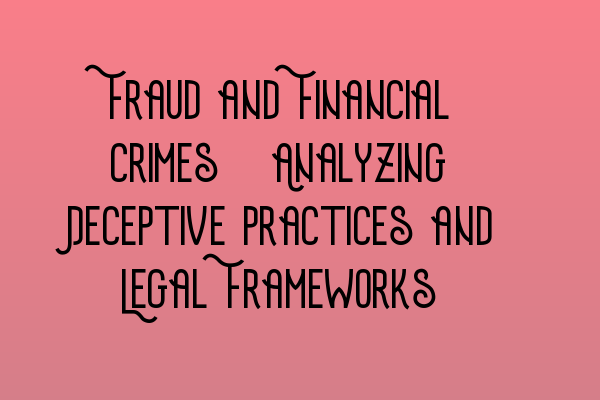Fraud and Financial Crimes: Analyzing Deceptive Practices and Legal Frameworks
In today’s complex financial landscape, fraud and financial crimes pose significant challenges to individuals, businesses, and governments alike. Deceptive practices can lead to substantial financial losses, damage to reputations, and even criminal investigations. It is crucial to understand the nature of these crimes, the legal frameworks surrounding them, and the steps that can be taken to prevent and prosecute such fraudulent activities.
The Scope of Fraud and Financial Crimes
Fraud and financial crimes encompass a wide range of unlawful activities designed to deceive, manipulate, or exploit financial systems for personal gain. These may include:
- Identity theft
- Embezzlement
- Money laundering
- Insurance fraud
- Securities fraud
- Bank fraud
- Cybercrime
Each of these fraudulent activities carries its own unique risks and challenges, requiring a comprehensive understanding of the legal frameworks in place to detect, investigate, and prosecute them.
The Legal Frameworks
In the United Kingdom, fraud and financial crimes are governed by a range of legislation, including the Fraud Act 2006, the Proceeds of Crime Act 2002, and various other regulatory provisions. These laws provide the necessary tools for law enforcement agencies, solicitors, and prosecutors to combat fraudulent practices.
The Fraud Act 2006, for example, defines and criminalizes different types of fraud, such as false representation, failure to disclose information, and abuse of position. This legislation sets out the elements of each offense and the corresponding penalties.
Additionally, the Proceeds of Crime Act 2002 focuses on preventing and recovering the proceeds of crime, including money laundering. This legislation enables law enforcement agencies to freeze and confiscate assets linked to criminal activities, ensuring that individuals or organizations do not benefit from their fraudulent acts.
Moreover, regulatory bodies such as the Financial Conduct Authority (FCA) and the Serious Fraud Office (SFO) play crucial roles in investigating and prosecuting financial crimes. These agencies work alongside solicitors, accountants, and other experts to build strong cases against perpetrators and protect the interests of victims.
Prevention and Detection
Preventing and detecting fraud and financial crimes requires a proactive approach from both individuals and businesses. It is essential to implement robust internal controls, including:
- Regular risk assessments
- Effective monitoring and reporting systems
- Staff training and awareness programs
- Strict compliance with legal and regulatory requirements
Furthermore, staying up-to-date with the latest developments and best practices in fraud prevention can significantly contribute to mitigating the risk of falling victim to deceptive practices. Consulting with solicitors and experts specializing in fraud and financial crimes can provide invaluable guidance and support.
For individuals and businesses seeking legal advice or representation in cases of fraud or financial crimes, SQE Criminal Law & Practice Law UK is a trusted resource. Their experienced solicitors understand the complexities of these cases and work tirelessly to protect their clients’ interests.
For a comprehensive understanding of the legal frameworks and regulations governing the business landscape in the UK, it is essential to refer to the following related articles:
- Demystifying the Solicitors Qualifying Examination Format
- LLC Formation Made Simple: Step-by-Step Guide for UK Entrepreneurs
- Business Regulations in the UK: A Comprehensive Overview
- Preparing for the SQE Exam: Strategies and Resources for Success
- SQE Workshops and Webinars: Accelerate Your Exam Preparation
By staying informed and seeking professional advice, individuals and businesses can better protect themselves against fraud and financial crimes, ultimately contributing to a safer and more secure financial environment.
